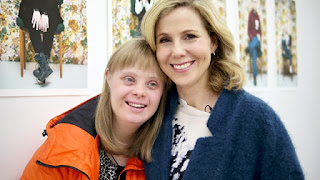The Curate Writes…
It won’t surprise many of you I was very interested to watch the recent BBC2 documentary A World Without Down’s Syndrome?, presented by Sally Phillips, about Down's syndrome and the ethics of pregnancy screening.
In January, it was announced that the NHS would be offering a Non-Invasive Pre-Natal Test (NIPT) which is believed to be 99% accurate in detecting Down’s Syndrome in pregnancies. This in itself is not a bad thing. But, at the moment, nine out of ten British women terminate after being given a positive diagnosis. Since the NIPT became available privately in the UK, terminations have gone up by a third. In Iceland 100% of positive tests result in abortion, and Denmark has pledged to be “Down’s free” by 2030.
It has since been revealed that Royal College of Obstetricians and Gynaecologists are looking at “the lifetime costs of caring for children and adults with Down’s syndrome,” to determine if “testing for all is cost-effective.” This has raised huge concerns amongst some that there is a move to eradicate a certain group of people, born with an extra chromosome, on the grounds they may cost more than the ‘average’ person to take care of.
The danger with this terminology, this focus on the potential problem and not the person, is that it breeds fear and misunderstanding – amongst parents-to-be, amongst families, amongst society as a whole. We see similar incidences in the press over child refugees, over those who receive benefits, people from ethnic minorities, people with disabilities, people who are ‘too old’. When we start speaking of people as things, as a problem to be solved – if we start talking about who deserves a place in our society based on economic or productivity grounds – we are on a dangerous path.
Ultimately, as Christians we believe each person is created in the image of God. The psalmist reminds us it was God who knit us together in our mother’s womb. “My frame was not hidden from you, when I was being made in secret, intricately woven in the depths of the earth,” says Psalm 139:15. And, if we take our faith seriously, we cannot be anything but welcoming to those different yet equally valuable to God. Because none of us deserve a place in God’s kingdom, not a single one of us has the ‘right’ to eternal life, the ‘right’ to a relationship with our creator. It is only through the life, death and resurrection of Jesus Christ, the sinless Son of God, that we are able to stand in the presence of God and proclaim the hope we have.
From the moment we were informed our daughter Phoebe was at high risk (not chance, risk) of having Down’s, we were told in great detail of the negatives, the extremes the condition may bring, but none of the positives. Yet she has never ‘suffered’ from Down’s Syndrome (though she certainly suffered from a heart condition we were told was “no problem” to fix!) And to watch her dance, see how she loves those around her and how she prays and praises Jesus is a far cry from the picture painted to us in that little airless room 3 years ago.
St. Paul reminds us that we are the body of Christ. “The members of the body that seem to be weaker are indispensable,” he tells the church in Corinth, reminding them “God has so arranged the body, giving the greater honour to the inferior member, that there may be no dissension within the body, but the members may have the same care for one another. If one member suffers, all suffer together with it; if one member is honoured, all rejoice together with it.”
In the documentary, Sally Phillips says “If we have a society that is unable to care for people, the problem is not the person.” What sort of a society do we want to be? What sort does God want us to be?


Our children are seen as more costly, although of course they bring so much value to our communities, but more than that I think learning disabilities are still seen as somehow sub-human. This is what we must alter. We are all human. Thank you for this super post. x
ReplyDeleteThanks Hayley - that means a great deal coming from you :-)
DeleteAs always you've managed to hit the nail on the head - it seems one of the biggest challenges we face is helping people to look past the stereotypes and see the person. You and your beautiful family are doing a great deal to help that happen x